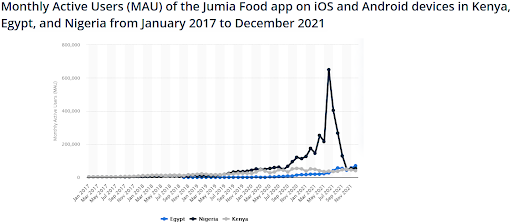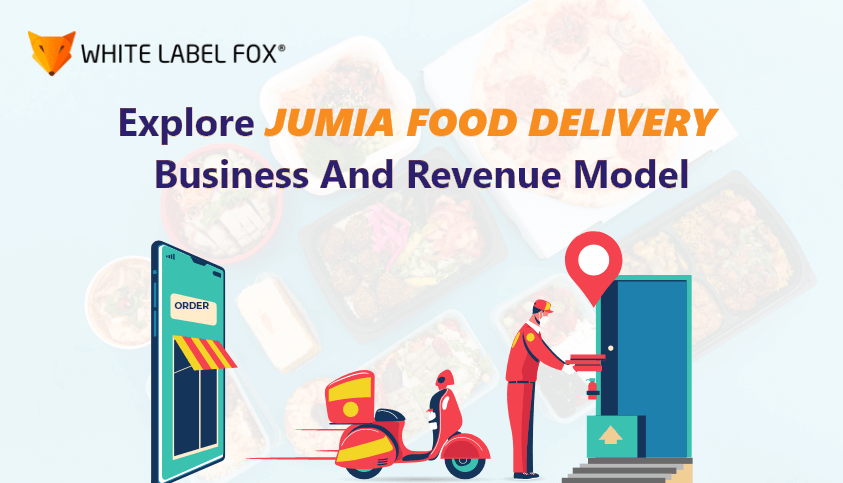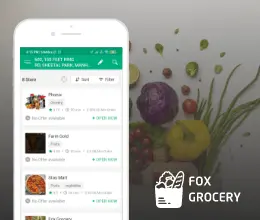Jumia Food Delivery App Business and Revenue Model
The idea of delivering hot and cooked meals isn’t a new phenomenon. The food delivery sector in Africa has witnessed dramatic growth; the boost has been exponential since the COVID-19 lockdown. To satisfy the growing demand for meal delivery, we have seen major players in the food delivery industry.
These include Jumia Food, Bolt, Food, Globo, UberEats, etc. In this article, we’re going to describe everything about Jumia Food, it’s business & revenue model. It also helps you have deep insight into why you must invest in the Jumia Food clone and how it allows you to meet the growing demand of customers in Africa and other cities where you want to operate. But before that, let’s explore what Jumia is, its success story, and more.
What is Jumia?
A Pan-African technology company, Jumia is built around logistics service, payment service, and marketplace. The company enables the delivery of packages via local partners’ networks; however, the payment services facilitate successful online transactions within Jumia’s ecosystem.
The company has also expanded to online African food delivery with the aim of making a profit. It has partnered with approximately 110,000 active sellers and is a direct competitor to Konga in Nigeria.
History and Success Story of Jumia Food Delivery App
Ex-McKinsey consultants Sacha Poignonnec and Jeremy Hodara founded Jumia along with Raphael Kofi Afaedor and Tunde Kehinde in 2012. It was initially launched in Nigeria and later expanded to Morocco, Egypt, South Africa, Ivory Coast, and Kenya.
The company launched its office in Tanzania, Tunisia, Cameroon, Uganda, Algeria, and Ghana in 2014. By 2018, the company offered food delivery and other services in more than 14 African countries.
The company launched Jumia Food and Jumia Travel in 2013. Later, Jumia Deal and Jumia One were launched in 2015 and 2017, respectively. In the same year, the company launched JumiaPay. In 2019, Jumia Food was suspended by the company, making it the 3rd county as part of continuous monitoring of the operating costs and business environment in the market where it operates.
Jumia Food is a popular prepared food and grocery delivery app that is providing its service in key African markets. The number of Jumia monthly active users in key African markets is expected to increase between 2017 and 2021 across Android and iOS devices. The company saw dramatic growth in 2021 in Nigeria; the number is expected to reach around 650 thousand active users in this country in 2021.
 Source: (Statista)
Source: (Statista)
Jumia experienced a shift in shopping habits in 2020 across the African markets as more people preferred to shop for food and grocery online. Shopping for essentials like groceries, food, and more saw the company’s total sales value grow by 13%.
Jumia ranked seventh among the top ten influential brands in Egypt in 2020. In 2021, the company launched its technology center in Egypt to offer its services to the African and Egyptian markets at large.
Jumia Business Model: How Does the Food Delivery App Work?
Jumia Africa-focused food delivery app has announced its financial results during the first quarter of 2021. Jumia’s losses are dropping with service growth in different cities. Jumia generated around 33 million in revenue in Q1 2021.
Jumia operates on the same business model as other delivery platforms do; however, it slightly tweaked its business model to focus on its third-party marketplace, where it contains a commission on items listed and sold on its platform.
Tweaks in Jumia’s business model and its pricing model have led to a drop in the cost of moving goods globally. Jumia Food has successfully satisfied the growing requirements of customers in 30 African cities. The company has partnered with 4,000 restaurants and offers different service types, including international fast food and local cuisine from popular brands like Pizza Hut, KFC, McDonald’s, etc.
Jumia Food is a convenient food delivery site that connects customers with nearby restaurants in Nigeria. The food is delivered to customers at their doorsteps whenever they want. Users need to download the Jumia Food delivery app on their smartphone. The restaurant or other delivery partner will be notified about the order; they will prepare it and hand it over to the customers’ doorstep. The food is delivered at the office via the Jumia food delivery system.
Looking at the growing meal and grocery delivery demand in Africa and other countries, many entrepreneurs are choosing to develop an online food ordering app like Jumia. You can also try your hands in the same segment with a ready-to-use Jumia Food clone built to satisfy all your food and grocery delivery demand efficiently. The easy-to-use app consists of all the essential features required to automate and operate a successful business.
How Does Jumia Food Work?
Jumia Food follows a simple workflow as other food ordering apps flow. You can check our UberEast clone script solution to know how other food and grocery delivery apps work and follow the same flow while creating a Jumia Food clone for your business.
The app makes it easier for customers to order food and grocery at their convenience. Check the step-by-step process to know how an app similar to Jumia makes everything easier for restaurants and customers.
- Customers can check the menu after downloading the app or visiting the site;
- The restaurant or stores that customers choose to order their needed thing will be notified about their order;
- Restaurants or stores prepare the order and hand it over to delivery providers;
- The delivery provider delivers the order to the customer’s place;
- Customers make payments and share their experiences as reviews.
Jumia Food ensures to provide as early delivery as possible if they don’t face any hurdles in between. The company follows an amazing approach to meet the growing demand of the customers in the country; you can also consider it for your business. Operation business becomes easier when you build a Jumia Food clone; the feature-rich app helps you have complete control over every business activity.
Jumia Food Revenue Model: How Does Jumia Food Make Money?
Jumia generated around 234 million in revenue in 2015; the company became the continent’s first unicorn, valued at 1 billion. In 2018, Jumia and Telcoin partnered to improve their payment service capabilities throughout their operation areas. The company also partnered with Carrefour to sell products in Africa.
On the New York Stock Exchange in Aprile 2019, Jumia went public and raised $196 million in net proceeds. The share price, offered at $14.50, rose 200% in just three trading sessions. The company’s revenue reached around $47.6 million in the first quarter of 2022; the overall revenue is 44% up on a year-over-year basis. Jumia follows an effective revenue model for all its services, including for its platform Jumia Food.
Jumia Food’s revenue model is simple, helping the company to make great revenue. Want to know how the food delivery app makes money? Explore different ways right here:
Delivery Charges
The company charges very few delivery charges. The delivery charges mostly depend on the distance that needs to travel between the restaurant and the customers’ doorstep. The estimated time and delivery charges will be displayed to the customers before they order and confirm the order.
Commissions
Jumia Food charges sellers a commission on the sale that is made on the platform. The commission mainly depends on the product category. The platform charges around 12% commission from the food partners.
Advertising Revenue
Jumia successfully generates advertising revenue from businesses that want to promote their products and services on the platform. Advertising revenue makes up a percentage of Jumia Food’s total revenue.
Subscription Revenue
Jumia Food also offers a subscription service that provides users exclusive deals, free shipping, and other advantages. Subscribers have to pay annual fees depending on the plan they choose.
Jumia Food is able to make money by charging sellers a commission on sales, generating advertising revenue from businesses, and collecting subscription fees from Jumia Prime subscribers.
The food delivery app has grown and has become popular among Americans and other people as well. If you want to get similar popularity, investing in the Jumia Food clone is a smart choice, helping you to generate greater revenue in a short time.
Why Develop a Jumia Food Clone?
The African food service market is expected to have a 7% of CAGR growth between 2022 and 2027. Comparable sales in South Africa have grown by .4%, benefiting from positive comparable sales and strong average growth primarily on dinner daypart. Food ordering and delivery companies’ marketing approach and promotional investments, along with delivery business growth, have positively impacted comparable sales during 2020.
With rising disposable income, dining, and eating-out trends, the market is estimated to experience growth over time. Looking at the growing demand of the market and customers to enjoy hot and ready-to-eat meals, it’s profitable to invest in Jumia Food Clone. It provides you with many perks like:
- Enables you to list multiple things on the menu;
- Boost business reach;
- Collect more orders and satisfy the needs of more customers;
- Provide a convenient way to make payments.
Investing in the delivery anything app can provide you with lots of benefits like automating business operations, managing everything from a single app, and more. So why lose various opportunities in today’s growing market? Get in touch with us to know the cost of the Jumia Food clone development, features, and more right away.
OUR PRODUCTS







